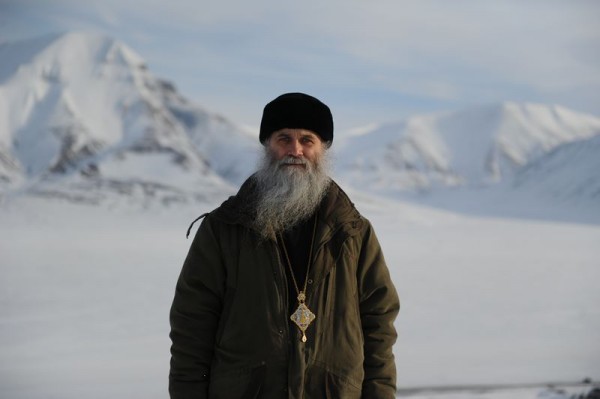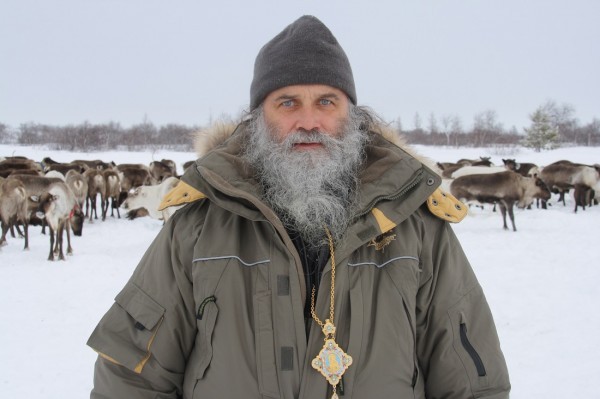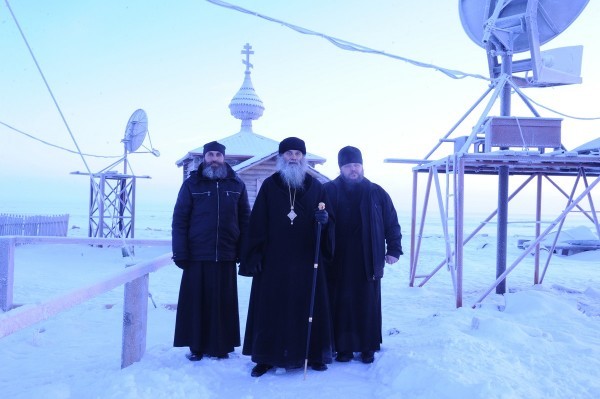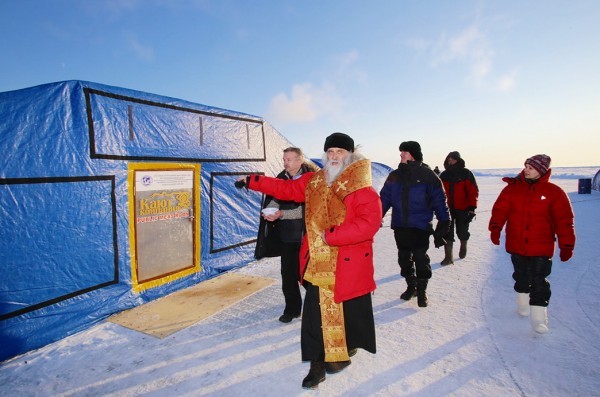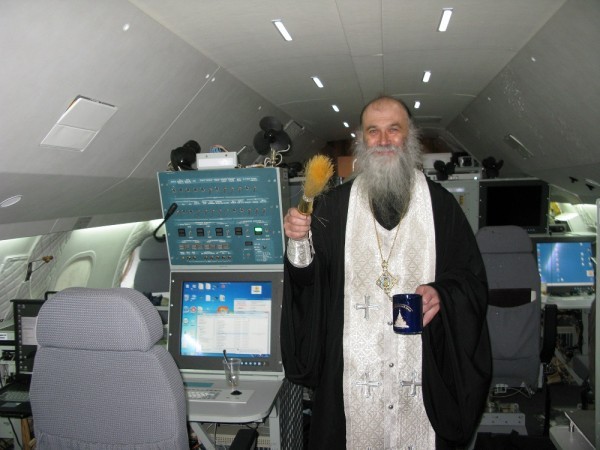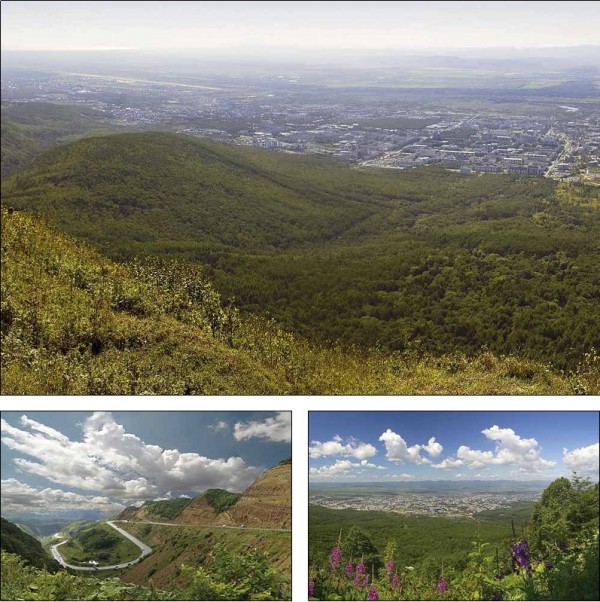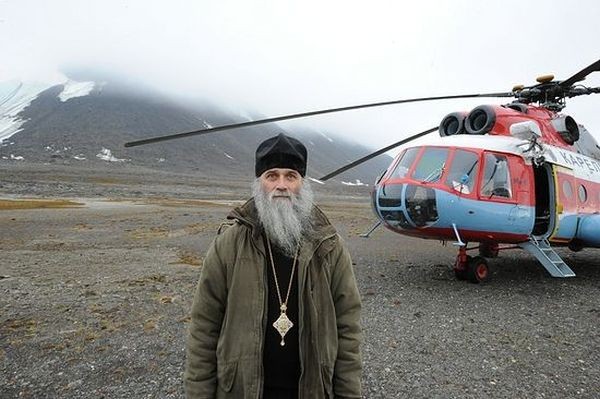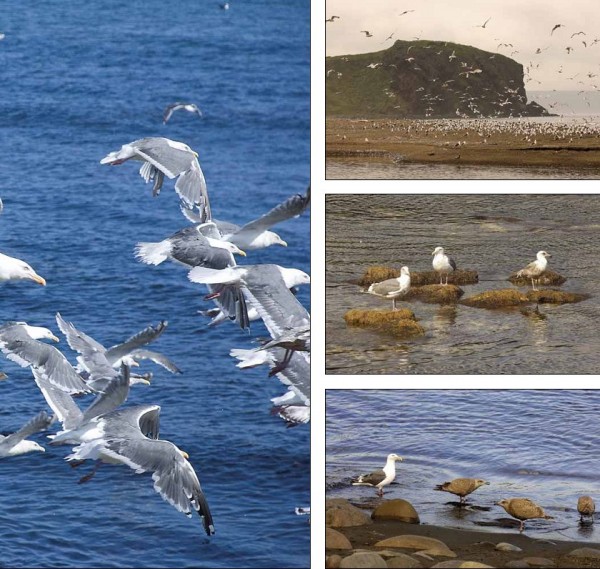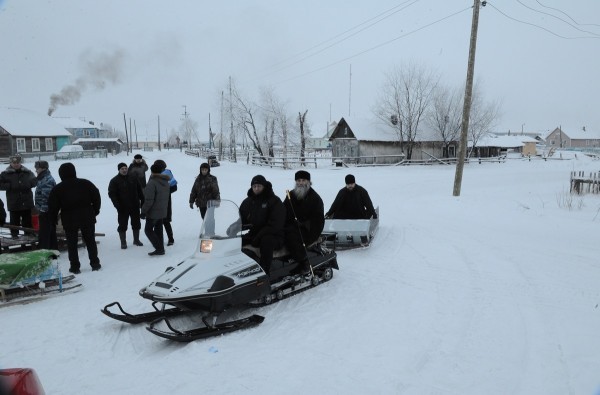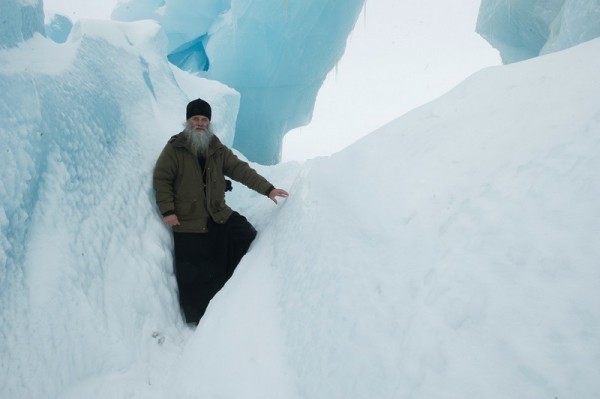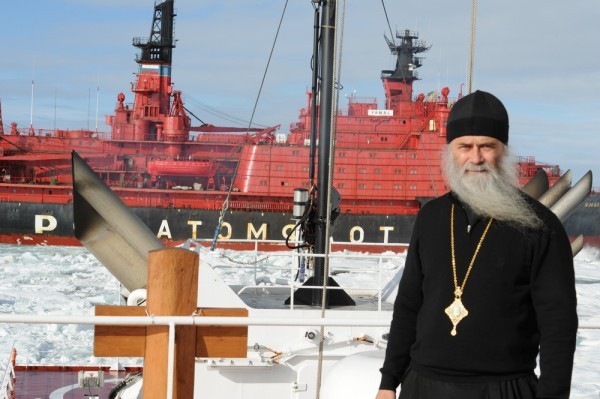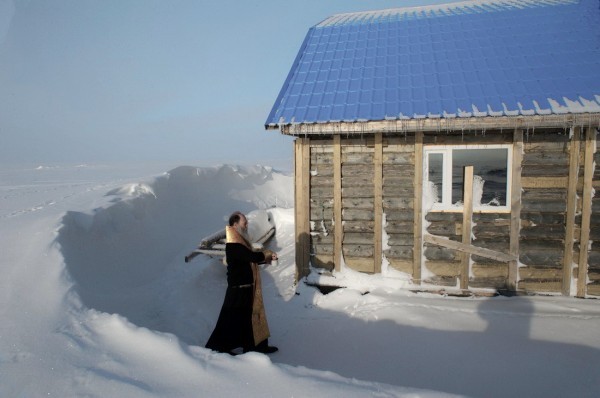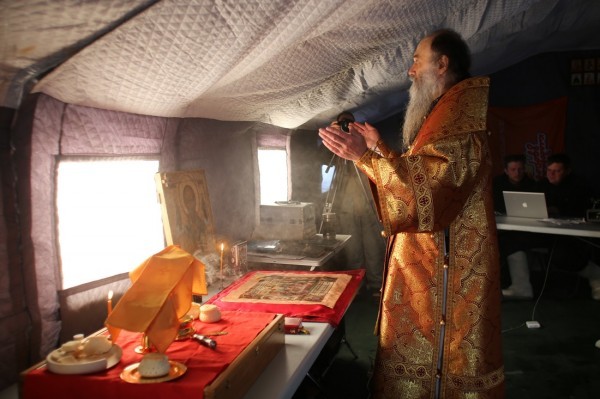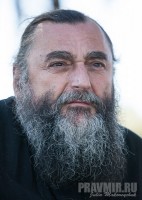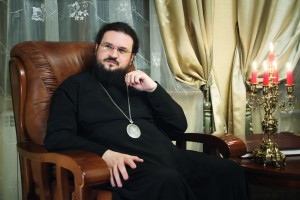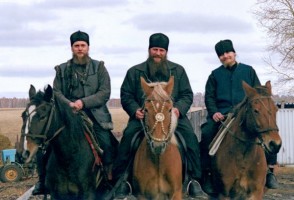My Mother Always Prayed
Vladyka, were you born into a family of believers?
The question is not as simple as it might first appear. Those were Soviet times, when all paths were closed for churchgoers. Now everything has changed, thank God, and dramatically so…
My mother tells me that she always prayed when she was young. She prayed both at school and at medical school – when she went to take an exam she asked for God’s help. I did not know this before, but now that my mother is old (even though she has followed me to the Arctic Circle) her stories help me to understand that her prayers were heard not merely at exams, but also at all the most important moments of her life.
When I visited my grandmother, I always noticed an icon at her place. She was a strong believer.
Were you baptized in infancy?
Yes. My parents lived in Stavropol. It was quite a patriarchal atmosphere there and Cossack traditions were strong. There are no unbaptized people there.
Students of the Philological Department Showed Sympathy
When did the encounter that willingly brought you to God take place? What determined your life’s path?
I think that question is ambiguous. Although Holy Scripture says that the heart of man answers to man, and that man is taught by man, sometimes such a clear mediation cannot be found.
I would rather note that, by God’s Providence, I applied to the philological faculty of Moscow State University against my father’s wishes. It may have been my mother’s influence, who loved literature and poetry very much. Evidently, this path – through classical Russian literature – was decisive for me.
Having enrolled in the English Department, I transferred to the Russian Department. Getting to know the creative path of Gogol, Dostoevsky, and Pushkin became a factor that compelled me to give thought to the things that are most crucial for a Russian. After the first year of study, I felt that I could not live without going to church or without the Church. Then students of the department showed sympathy, and that played a part as well. My classmate in the Structural Linguistics Department, Sasha Troitsky, introduced me to his spiritual father and brought me along to church. That is how my true Christian life began. That was 1979.
Times were hard back then…
Yes. I vividly remember the blockades around the churches, the crush, and the lines of Komsomols during the Paschal divine services… Naturally, there were so-called “first” departments at universities, especially in humanitarian ones.
Did you feel any pressure exerted on you? After all, information still leaked?
Moscow State University was a unique institution. It was quite difficult to influence students there. There were always many foreign students, and there were many students whose parents held important positions in the government. Therefore, I did not feel “pressure” in such an atmosphere.
Who was your first spiritual father? Which church did you attend?
It was the Church of Saint Nicholas situated nearby the Paveletsky Railway Station in Kuznetsty. Father Vsevolod Schpiller was the rector of the church. A large group of priests gathered around him, whom he taught and protected by his authority. His spiritual friendship with Metropolitan Anthony of Sourozh was a powerful leverage that preserved a special status for this church.
“How Did You Become a Monk?” – “I Just Led a Christian Life”
When did the idea to become a monk first occur to you? Did you share this with your loved ones?
I did not give it any thought. I just led a Christian life: I went to church and prayed. Among the clergymen of this church was Hieromonk Paul (Lysak), and among the parishioners were young believers from the university: Misha Seleznev, who is now the leading biblical scholar in the Moscow Patriarchate, and Lena Golovina, who is the daughter of the leading mathematicians of the university. They were true young believers. One could count on the fingers of one hand such believers back then. They confessed to Father Paul. I was among them.
I believe it was wonderful to take my first steps in the Christian life together with like-minded people, who took their choice seriously and were my true friends.
I read books and prayed. Perhaps the general course of my life gradually reached the point that I, without thinking much about it or planning it, entered seminary and then academy after finishing my service in the army. Then the proximity of the brethren of the Lavra played a role. Among them was the future Metropolitan Daniel, my mentor and my very good friend and colleague.
My connection with the Lavra became stronger and stronger, so I submitted a petition for including me among the brethren. Having received a blessing, I joined the brethren in May 1990.
What was your parents’ reaction to this?
I do not remember all of those conversations. In fact, from the time I left Vladimir, where I lived starting in 1967 until I entered university, I was already independent. Years of study and service in the army as a lieutenant all accustomed me to being responsible.
In my parents’ opinion, this choice was probably unnatural, because monasticism is a departure from a wordly way of life. However, it was fine with them.
Philology Means “Love”
Your first written work was Creators of Rus’, about pre-Mongolian Russian monasticism. How did this idea occur to you, and under what circumstances?
It was my master’s thesis. I actually wrote it in the Moscow Patriarchate, where I served as an assistant to His Holiness, Patriarch Alexy II, for four years. I already had specific and very responsible duties and lived in a wing of the patriarchal residence on Chisty Street. There I worked on my thesis by myself and was highly interested in it.
My research adviser was Father Vladislav Tsypin who, by the way, was from the same clerical group from the Saint Nicholas Church. At some point I saw him when he was still a layman among the spiritual children of my spiritual father, Father Vsevolod Schpiller.
So how did you think of this book?
At first I was going to write about asceticism in the Patristic Department, but I am not sure what the situation was: either I was not interested in the themes or the professor had already formed a group. However, I was probably more interested in learning and understanding the path of asceticism in Russian monasticism.
Do you mean the initial period?
Yes, because one should begin everything ab ovo. It was truly an extraordinary period of holiness and high achievement. This period laid the foundation of everything else and created Holy Rus’. In the works of the ascetics of Rus’ one can see the power of the Russian Church and the Russian state.
Did you have any academic interest in it as a philologist, rather than as a theologian?
I do not think that we should separate them. Philology literally means “love for the word,” and “word” can be written either with a capital letter or small. I prefer speaking about unity. The logic is clear: undoubtedly, we study Holy Scripture not just from the standpoint of theology, but also of philology.
A childhood in Vladimir, the Philological Faculty at Moscow State University, the army. Which period of your pre-Church life do you consider the most crucial?
I consider my entrance into University to be the landmark in my life. Lectures – such as in linguistics, philology, and especially Russian philology – showed me the depth of human spiritual aspirations. Russian literature, of course, stands head and shoulders above other national literatures, due to the fact that we, Russians, have always solved the most crucial life issues in a rather different way than did Shakespeare’s Hamlet. In my opinion, the epistolary heritage and writers’ diaries are as important in understanding the creative works of masters of words as their works themselves.
The Wise Patriarch
You have already mentioned that you served near His Holiness, Patriarch Alexy II, for several years, and you always remember him with gratitude. What do you remember the most from your communication with him?
His wisdom. He was always like that in making decisions. He lived during extremely difficult times – the Yeltsin years – when everything was uncertain and there were certain powers that were trying to discredit the Church and involve it in projects that were unnatural for it…
The Patriarch was very wise. God’s Providence assigned him to live in such a difficult time, which provided him with an opportunity to do good – today we have it, too, but in reality it is very challenging to implement.
The current Patriarch has an enormous field of activity. In his life, Patriarch Alexy II carried out the podvig of patience and making wise decisions. Today the formation and struggle for Russia, and the organization of life, take place based on a foundation established in part by Patriarch Alexy II.
Everything testifies to this nowadays: the mass media, and demographers, and economists, and also our political situation with Ukraine. We should consider not merely economics, nor demographics, nor even culture, but mostly the spiritual core that has preserved our Russia and will continue to do so with God’s help – if only people will keep the spiritual heritage of Rus’ and build their lives based on Christian principles.
Monasticism and Serving the World Combine Organically
You were part of the Brotherhood of the Trinity-St. Sergius Lavra for over twenty years. What did this period provide you with?
I will answer with only one word: happiness. I remember the years of obedience with a feeling of joy and gratitude. It was a blessed time… I remember Vladyka Daniel (Father Daniel back then), who was in charge, for his kindness and honesty. He was already the dean of the Lavra. My cell was next to his cell and office. We prayed together.
Having accepted the responsibility to chair the Lavra’s film studio, I read scripts and met with friends of Vladyka Daniel. It was a large, rich circle. Then his lofty service as a bishop began and I made expeditions to his diocese in the Far East. Today our spiritual unity, collaboration, and common prayer continue.
You said that you were in charge of a film studio and that you edited a newspaper… How, in your opinion, does the monastic life, which involves self-renunciation, combine with creative work, which includes the development of, so to speak, individualism and self-disclosure?
I cannot say that the general meaning of the term “individualism” is appropriate here. Monasticism and serving the world combine very organically. We can see this in the deeds of the ancient Holy Fathers. Recall Saint Vitaly, who would put on worldly clothes and go to brothels, give his money to those women, and tell them about the heights of Christian life and purity all night. Thus, he saved many souls.
Monasticism is the spearhead of the Church directed toward people in order to salt the world, so that people would see the true meaning of life and understand how they should live. It is extremely relevant nowadays, because the decades of war between the atheistic government and the Church have unfortunately left its imprint on us.
One of my very good friends told me about a certain monk. His parents visited him and heard from him: “You have disturbed my peace.” This is not a monk. A monk is supposed to live in such a way that would bring his parents to Christ by his Christian kindness, his love for his neighbors, and his spiritual richness of heart – not by showing them to the door. True monasticism is always missionary work. It is hard work, not a selfish pursuit of quiet, even on the premises of a monastery. Yes, a monastery is surrounded by walls, because the world lies in wickedness.
We should free ourselves from this hustle and bustle and avoid its infiltration into cells, churches, and the monastic life. However, monks themselves are a kind of storage battery, which always gathers spiritual energy in order truly to salt the world and support it, by bringing people to God by their words and example.
Vladyka, are you currently engaged in photography? Do you have enough time for it?
Of course. Not many people have a chance to visit the places that I visit. Although it is hard work, requiring time and strength – and not just of the emotional kind. The Nikon 3 camera is heavy, plus three lenses, plus a tripod – it is even physically hard to carry around. But it is worth it, as you can assure yourself at the website of our diocese.
Of course, I had a camera when I went on my first expedition to the Far East, where Vladyka Daniel had invited me to make a film during my years at the Lavra, which would reflect the restoration of Orthodox Christianity in the insular and easternmost diocese of the Russian Orthodox Church. A film is one genre and photography is another. I take both photo and video cameras on my missionary trips. These materials are in demand, as testified to both by the books and calendars of the Patriarchal project called “Russian Arctic” and our website.
About Hobbies and the Source of Strength
Do you have any time left for reading, for a hobby, or some other enthusiasm?
I think that a “hobby” or an “enthusiasm” are totally inappropriate terms and concepts in relation to a clergyman. We have the work of our lives. Although I have met such examples, I do not understand those who consider communication with people to be a burden. If you sow the word, the Lord will give you strength. Therefore, there is no such fatigue as a layman might experience.
There was a time when I was a guide at the Church-Archaeological Cabinet of the Moscow Theological Academy and Seminary, during my study at that institution. When secular people came and you gave them a tour for around an hour and a half, it was exhausting. However, when you serve, preach, or pray – strength is given to you. It is paradoxical, but true.
Secular people consider these activities in a different way: they think it is extremely hard to stand and pray for hours. Actually, the experience is completely different. So when I see a clergyman to whom such service is a burden, I understand that he is out of place. That happens sometimes: life is complicated and people make mistakes. Sometimes they carry out their own plans rather than God’s Providence – and they are not the same thing.
I am now writing a book about the North. We are holding an exhibition about the great consecration of a church in Antarctica. With God’s help, we will make an album of the expedition – the consecration of a church in Antarctica. Of course, extensive expedition work is still taking place.
As far as reading is concerned, there is a pattern that secular people hardly notice, in my opinion: when you read fiction or journalistic works written by a person, and only by a person, you may find it very interesting. Later you will start to notice certain seams. Then you will start to notice the shortcomings. I, just like any other monk, read the monastic prayer rule. It helps me a great deal. It seems to be “the same thing,” but it is like breathing – you breathe and it is easy for you, although each breath is the same.
I read the Gospels, the New Testament, and the Old Testament – the didactic books that I taught in the Moscow theological schools. I try to read the Psalms by kathisma, and to read The Philokalia a little, because, you know, one of the didactic Biblical books says that one should eat honey moderately, so that your throat would not find it repellent. Certainly, I read other books as well, which might not always seem to be a natural choice for a clergyman, but I am interested in current cultural trends. They speak volumes. A spiritual foundation gives one an opportunity to understand them and evaluate objectively.
I enjoy reading works on the history of culture and science, and on geographical research. I find it interesting. When I fly somewhere, I always take the magazine called Russian World, the latest edition, and read what people have to say about the paths of Russia. Allow me put it like this: as a bishop I am more open than some people may think.
“Polar Explorers Need the Church”
What are your impressions of Antarctica? Would you like to return there? Vladyka Daniel said that you are attracted by places that are difficult to reach. Would you agree?
I think this question is not phrased quite right. Any real, in other words necessary, work is always hard. When people ask me such questions, I answer that the most difficult thing is to serve in comfortable, rich, and cultural Moscow. Look at the Patriarch: he has an enormous, immeasurable burden of work and responsibility.
I can say about myself that I relax on expeditions – I physically rest and get enough sleep.
Would you like to return to Antarctica?
The Patriarch called me “the Bishop of All the Arctic and Antarctica.” (It was probably done as a joke, but I think that there is a gain of truth in every joke.) I can see that polar explorers need the Church. Even as I was flying here to Arkhangelsk, I met two members of the Polar Explorers Association in Vnukovo and we immediately started talking about “our north.”
It is essential that people would find a way to God even on expeditions, through conversation and Orthodox literature. I have no doubt that it will be in demand, because I know it from experience. My first expedition was for the opening of a church in 2004. After five years, I returned for its fifth anniversary. Now in Antarctica, there is the great consecration of the church, which the Patriarch blessed and entrusted me with performing. The field of labor is large, so one must work all the more. As for the future, it is as God wills: I do not wish to “make plans,” or especially to guess.
Living or working above the Polar Circle is hard work. The conditions are simply not designed for life. Polar explorers often ask clergymen for advice. What advice do they need, and what do you suggest?
The Polar Circle and polar explorers are not synonymous terms. The rule is the same everywhere: when people experience difficulties, then they ask for advice. That is usually the case. Fortunately, the fruit of our labor is now more and more apparent.
I recently consecrated a chapel at the request of a director of the Naryan-Mar college. He built this chapel in a forest-tundra. Thus began our communication, which resulted in his Baptism. By the way, he was Baptized the day after his sixty-sixth birthday. He got married on the same day. A week later, he received Holy Communion.
A human soul’s path to Christ is always difficult, because it involves not just the development of skills or even the construction of the most essential objects, but people. Should we speak about polar explorers, oil workers, seamen, or reindeer herders? Absolutely. However, the present time may be unique in that we should go to them, not wait for them to come to us.
True, oil workers themselves came to ask for prayers that the ice road would last long. The “Bashneft” company has given arduous tasks to its branch organization in our region. Vladimir Mikhailovich Nesterenko came to me and said: “Vladyka, I need your help.” Glory be to God, the oil workers managed to complete their tasks – God helps those who help themselves – and the result of their honest gratitude was their help in the restoration of a side altar, which was so essential for Naryan-Mar. Now we can celebrate two Liturgies (early and late) on great feast days and Pascha.
We need to go to the people. This is the main rule for everyone, regardless of where we serve: be it in Moscow, the Far East, the South, or the Polar Circle. The reason is that many people have forgotten how to think about God correctly following the decades during which life-creating faith was abandoned. However, thank God, the time has come to gather the stones.
The Most Difficult Thing is Being Alone
What, in your opinion, is the most difficult thing about living in the North?
It is probably the same not merely for my ministry or the ministry of clergymen, but for everyone who performs essential and important tasks in the North: being alone is the most difficult thing. This concerns not so much external circumstances, when there is nowhere to get help; it is loneliness in and of itself, which everyone experiences. It hardens and serves as a general standard of whether the North accepts a person, or whether he cannot bear it and leaves. Being alone is the most difficult thing. But the Lord sends both people and help in His own way. Such difficulties are perhaps essential.
Can we speak about certain differences of church life in the Far North and, for example, in the Midlands?
Certainly. I have a dire need for clergymen. Where can I get them here? There is such a large territory and so few people, especially those who would be prepared, who would meet canonical rules, and who would be willing to devote their lives to serving God.
In the central regions of Russia there are priests and one can choose the best for a certain task. I do not have such a choice. The only thing left for me to do is to pray to God, and not sit idly by – as is the case everywhere and for everyone.
This is confirmed by my brother-archpastors, clergymen, and even laity. Finding people is the hardest task. And in the conditions of the Far North, this is the problem of problems and the task of tasks. For example, having visited us with the blessing of one of our Elders from the Lavra, a seminarian after the third or forth year of study spent one year here and then went home. It was difficult for him: “Vladyka, you can do this, but we cannot.” However, I do not agree with putting it that way, because it means justifying oneself in rejecting one’s cross.
I do not have any way of keeping people here. Everything is measured by a person himself: whether he can perform this podvig and feel joy therein; or is he looking for other, easier ways, and the improvement of earthly life.
“Look on the Spot – Everything Else is Fragile”
What do you think about the idea of assigning graduates of theological institutions?
I recently met with Vladyka Dimitry of Tobolsk, whom I have know for a long time. I asked him about such a possibility and received confirmation of the words of Metropolitan Barsanuphius: “Vladyka, look on the spot, because everything else is fragile.” It is, of course, possible to send a clergyman here if he agrees, but only monks and only for a certain period. However, this is not a solution to the problem.
Besides, constitutional norms prevent church institutions from assigning people like they do in the army, for instance. This is bad: a clergyman has to be ready – not for difficulties, but for his ministry, under any circumstances. This will train him and help him become who he needs to become.
I feel something of white envy looking at the works of the late Bishop Zosima of Yakutia. There were similar circumstances: in the Far North there were large territories, but few people – but a seminary is being founded there. That means that people have been found! There is already a church school there, and the current Vladyka is continuing this work.
To Be All Things for All Men
What do you think is the essence of hierarchal ministry?
The Apostle Paul put it this way: to be all things for all men. That is all. One could not put it better or more concisely. I can see this in the archpastors whom I know, such as Vladyka Daniel; this is my lot, whether I want it or not. Another thing is how deeply can one comprehend the Apostle’s word.
Were you frightened to begin your archpastoral ministry?
Actually, I was frightened. But later, when I arrived and began my ministry, and started to communicate with people, everything normalized. People are usually scared of the unknown. But God helped me through people and through many circumstances, even through the administration of the air company “UTair,” thanks to which I can fly and work on the most crucial projects.
In material terms, the diocese is very poor, even though the region is very rich with resources. Unfortunately, up to the present time, people who would like to see an ideal situation, often say: “Vladyka, oil workers are supposed to come to you and ask: ‘What can we do to help?’” It has not happened yet, except for the above-mentioned exception.
Why is that so? The richest region, the richest companies…
First of all, it is connected with the “glorious” Soviet past, in which the Church had no right to exist. Secondly, with our “glorious” democratic present, where the measure of all things is money, and the goal of everything is money. People have to go through many difficulties in order to understand that we will take only the good or, alas, evil with us. That includes everything we have done, thought of, or managed to fulfill. Everyone probably has to complete his own life journey in order to understand this.
I have come to a conclusion from my earlier life: in order not to feel ashamed before somebody, I have just stopped asking for help. I would rather ask God. He helps in reality, because the Lord sends those people who are willing and are able to do good.
Have you encountered direct anti-church sentiments?
Yes, I have. The reason is the same, regardless of age or social position. What are people afraid of in reality? Podvig. The most difficult thing is to want to change for the better. It does not matter where you are: in the North, in Moscow, or in New York. People are scared to begin leading a life of sacrifice for God. But if they begin to lead this life, they unexpectedly discover that it brings them true joy.
I am not talking about material benefits. The Lord did not say: “Give Me this or that.” Yes, tithing existed in Orthodox Russia at some point in the past, and some Christian countries still have a tax so that the Church can perform its very multifaceted activities, including charitable and missionary work, and on and on. However, God says to all of us: My Son, give Me thine heart (Proverbs 23:26).
What are the main development projects of the diocese now?
I will tell you at once that all of them are challenging: the construction of a spiritual and educational center and missionary work; and, of course, what most distinguishes our diocese as the northernmost diocese of Russia is the outermost northern territories. Likewise, there are expedition activities and cooperation with polar explorers in both the Arctic and Antarctica, because technically it is a single cohort of people.
The Personnel Problem
Vladyka, how active is parish life is in the diocese?
I have only two clergymen in Naryan-Mar. Apart from divine services, they conduct work in homes for the elderly and physically handicapped people and in a volunteer organization in honor of the Myrrh-Bearing Women; the serve weekly in a maternity clinic; they work on child protection; and they work on radio and television – Glory be to God, we have managed to implement all of these projects after several attempts and the change of managers. We closely cooperate with law enforcement agencies, the Ministry of Emergency Situations, and the public prosecution office.
Of course, I feel the duty to perform great deeds, but to whom can I entrust them? If I had trained personnel, I would be able to do much more.
Have you considered the development of monasticism in the diocese?
Of course. I can see a women’s community gathering around the church. This is correct from all points of view, because there are people who can make up the core of a monastic community. Our plans, God willing, include the construction of a monastic building together with the foundation of the spiritual-educational center. Then this task will be implemented in reality. There are women who have already devoted their lives to God, who offer themselves as sacrifices in a good sense. They find joy and consolation in it. For example, there is an elderly woman, who just celebrated her seventieth birthday the other day. Sometimes on a working day, she sings all alone on the kliros.
Personal Questions
Vladyka, here are some personal questions. Where do you find your greatest joy?
In prayerful communion with people.
What is the most important thing that you learned from your parents?
It is being an idealist (not a dreamer), and seeing things as they are; and love for the word.
As a child what did you dream of becoming?
Until the eighth grade, I thought I would follow in my father’s footsteps and enter the aviation industry.
Have you ever been in danger, and has this influenced you in any way?
Of course I have, and more than once. I will mention a fire at the Moscow Theological Academy in 1987, when we, third-year seminarians, fled from the burning building. Some leaped out of windows, some broke sheets of glass with their bare hands and cut themselves… Five people died. It was a dreadful ordeal…
During my last expedition (in autumn 2013), a violent storm hit us in the Chukchi Sea. We were on a small ship of the frontier service, its weight was around 1700 tons. I will say the following for those who are familiar with the sea: several times the careen was 45 degrees. It was, one might say, a flight. I was on the deck bridge together with the captain all the time for almost two days. I prayed. Glory be to God, I am not prone to seasickness.
Honestly though, these events have not influenced me in a special way; I mean in an essential way nothing changed. Yes, I was scared, but if a person is on the right path, what difference does it make? Sometimes, when there are matters of life and death, someone might make a vow before God and ask to be saved – and he is. But this was not my experience.
Vladyka, what book or author do you return to most of all, apart from service books?
We are currently preparing an edition of a book entitled Citizens of Heaven by Valentin Sventistky. This documentary left a strong impression on me. I always return to the Book of Books, because it is an inexhaustible source of eternal good.
What would you like to tell and explain to all people?
I think the question is not put properly. All of us should spread the Gospel.
What worries you the most today? What is your biggest concern?
People, in every sense of this word: clergymen, the flock, the administration, and executives.
Is there a sin that cannot be forgiven? Do you easily forgive grudges?
Sins and grudges are different things. There is only one sin that cannot be forgiven: unrepentant sin. If a person does not repent, then how one can forgive him? Concerning grudges, you know, it is actually a problem of the person himself, not of the one who was offended. I treat these matters very calmly. On the one hand, I am used to such situations; and on the other hand, it is always better to look towards God, rather than to people. If you look for people’s understanding or help, you will undoubtedly either begin to be disappointed in them (and in oneself, too) to a greater or lesser extent, or you will understand their imperfections. But when you place your hope on God, then people will also show themselves in the best light.
Can anything make you angry? What?
Of course. Negligence, negligence, and again negligence in things that do not tolerate negligence. The Holy Scripture says severe words about this: “cursed be he that does the work of the Lord deceitfully.” I cannot accept this, and I am not going to.
How should one fight annoyance, if one experiences it?
By doing real work.
Have there been moments when you felt that you were ready to throw up your hands, and that you had no strength to keep fighting?
There have been, of course, although I would not put it that way: this is not entirely correct for a Christian. The real fight goes on inside you. We need faith, fortitude of spirit, and patience.
I will tell you about a high-latitude expedition on the icebreaker “Russia” (September-October 2012). Going through the British channel, we appeared at the ice edge far from the lands of Franz-Joseph, and suddenly we find out that we are not going to cross the North Pole, but are going straight toward the drifting station “SP-39.”
I was absolutely certain that the route had been planned through the North Pole and that the illumination of the Pole would take place. I knew that suggesting a change of course would be silly and pointless. I know from experience that there are no hopeless situations. But this time it was truly hopeless. I could not think of anything and prayed: “Lord, be it as Thou directest!”
The next afternoon, I climbed onto the deck bridge and suddenly hear that the captain had changed the course to the North Pole – without any of my requests. Why? The worthy sea captain, who had led expeditions for twenty-eight years, had never been to the North Pole! “Russia” will go to the Baltics next season. Then, the change of nuclear fuel will take place and I cannot imagine what will happen next. The captain has grandchildren. The time will certainly come when his grandchildren will ask him: “Grandpa, tell us about your trip to the North Pole!” The grandfather had made a strong-willed decision to go to the North Pole. It was an “ordinary” miracle.

Bishop Iakov and the country representatives delegation – the members of the Arctic Council in the North Pole
About Negligent Pastors and Lukewarm Laity
All people experience the condition of lukewarmness, of “stony insensibility.” How have you fought with such feelings, if you have had them? How can one rekindle one’s faith, when everything becomes boring and ordinary?
Many Holy Fathers have an answer to this. I try to read a little of The Philokalia, a page a day. The Holy Fathers write that we should alternate prayer, work, and books… There are plenty of things that need to get done. Shoveling the snow around the church really helps in the Polar Circle. Really.
Do you mean you do this yourself?
Yes, I do. There is a saying: “ora et laboro,” which means “pray and work,” which has come from ancient times.
What is the main problem of clergymen today? What do you draw their attention to most of all?
This problem has always existed: Chrysostom pronounced severe words in one of his sermons about the fact that no one had ever brought as much harm to the Church as its negligent clergymen. We should be zealous to the point of self-sacrifice in everything.
Is this your message for pastors?
It is not my message, it is a uniform and important principle of church life; otherwise one would be unable to carry the gift and burden of the priesthood.
What is the biggest problem of laity?
For the world, it is probably lukewarmness. The Prophet Ezra says in his third book (I do not remember the exact words, but the meaning is the following): the time will come when one domain will ask another: “Have you seen the truth? Has it not passed by you?” The other will answer: “No.” Look at what is happening in Ukraine. Why? People have lost this truth. The Church speaks about it, but people cannot preserve it.
I will give you an example from the life of Naryan-Mar. Having arrived, I am going through inspection. A woman is standing there with a cross around her neck. I ask her: “Have you been to our church? I somehow do not remember you.” “I do not go there. I do not need it.” There is the answer for you. I leave and hear her say: “Maybe when I feel bad, I will come.”
The most dreadful thing is when a person wears a cross, but does not feel the need for God. This, by the way, concerns everyone: including oil workers, officials, directors of schools, and ordinary workers.
What is the greatest strength of a modern Christian?
It is in Christ. This power is uniform for all Christians of all times.
Do you have your favorite, closest saint?
How does one classify saints? It is they who can classify us according to our life and deeds: “You are closer, but you…” I feel that my protector is Saint Nicholas. Saint Sergius – how can I choose? It is wrong to put the question this way; it is the wrong frame of reference. Such a question implies that the center of gravity is in you, but it should always be in God.
Translated from the Russian.












